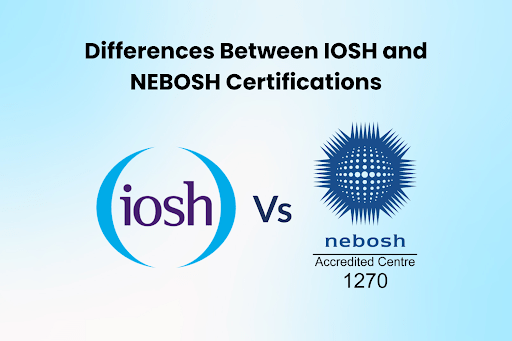Digital Marketing
Differences Between IOSH and NEBOSH Certifications

Getting the proper credentials is crucial for occupational safety. Among the different qualifications, two leading names in the industry stand out: IOSH (Institution of Occupational Safety and Health) and NEBOSH (National Examination Board in Occupational Safety and Health).
People who want to increase their level of knowledge frequently choose one or the other, such as IOSH Online Training. In this blog, we’ll go over the distinctions between IOSH and NEBOSH.
Safety Mastery with IOSH Training
Before going into the differences, let us discuss the significance of IOSH training. In a time when digital connectivity rules, the adaptability of online education has become essential. From the comfort of their homes, prospective safety professionals can start their path of knowledge acquisition. The IOSH certification offers a comprehensive approach to occupational safety and is well-known for emphasizing academic knowledge and practical abilities.
IOSH online training is a career accelerator for anyone in the safety industry, regardless of experience level. It increases your employability in a competitive job market and gives you the tools to negotiate challenging safety scenarios.
IOSH Certification
The Foundation of Safety Competence
The IOSH certification is a mark of fundamental proficiency in occupational safety. It imparts a thorough awareness of safety principles and is geared toward professionals at different stages of their careers. The course ensures a thorough understanding of safety management by covering various topics, from risk assessment to legal frameworks.
IOSH vs NEBOSH: A Comparative Glimpse
As we delve deeper into safety certifications, one inevitable question arises: What distinguishes IOSH from NEBOSH? Although the two certifications aim to raise safety standards, their focus and scope are different.
NEBOSH Certification
Comprehensive and Rigorous Training
NEBOSH, widely regarded as the industry standard for safety certifications, serves people seeking a more thorough and demanding training program. The NEBOSH certification is accepted worldwide and covers a broad spectrum of sectors. It is the perfect option for anyone who wants to become an expert in the subject because it deeply explains the nuances of health and safety management.
IOSH vs NEBOSH: Tailoring Your Path
When deciding between IOSH and NEBOSH, matching your professional objectives with each certification’s advantages is critical. IOSH may be the best option if you’re searching for a thorough grasp of occupational safety concepts with a focus on real-world application. On the other side, NEBOSH provides a more rigorous program if you’re looking for a deeper look at safety management.
Key Differences Between IOSH and NEBOSH
Scope and Depth of Content
IOSH: Well-known for its adaptability, IOSH addresses a wide range of safety issues without becoming too bogged down in the particulars of any one business. It provides a comprehensive understanding of safety management and is a great starting point for professionals in various industries.
NEBOSH: Known for its thoroughness, NEBOSH explores scenarios unique to a given sector in great detail. A certification is a popular option for anyone looking for specialized knowledge because it is designed to handle the nuances of safety management within particular industries.
Industry Recognition
IOSH: An industry standard, IOSH certification is a mark of proficiency that leads to many options. Employers find value in the theoretical and practical skills taught by IOSH training. Therefore, it’s a great advantage for your career.
NEBOSH: Having gained international prominence, NEBOSH is frequently seen as a symbol of superior safety management. Employers worldwide qualify in the highest regard, particularly in fields where a thorough awareness of the unique safety issues a specific industry faces is essential.
Examination Format
IOSH: A practical workplace project and a set of multiple-choice questions are frequently included in the evaluation process for IOSH certification. This structure guarantees that applicants can apply theoretical ideas in practical settings in addition to understanding them.
NEBOSH: Renowned for its rigorous testing procedures, NEBOSH examinations usually consist of written tests that gauge a candidate’s comprehension of intricate safety management ideas. The emphasis on in-depth knowledge is one aspect of NEBOSH exams that sets them apart.
Choosing the Right Path for Your Safety Career
Consider Your Career Aspirations
Think about your professional goals when choosing between IOSH and NEBOSH. If you want a comprehensive understanding of safety principles that apply to all industries, IOSH can be a good place to start. Conversely, should you aspire to become an industry expert in safety management, NEBOSH may assist you in achieving your goals.
Evaluate Industry Requirements
Safety requirements vary throughout industries. Examine the requirements of the industry you want to work in before deciding on a certification path. Whereas IOSH serves a wide range of industries, NEBOSH focuses on offering the in-depth expertise required for specific industries such as manufacturing, oil and gas, and construction.
Conclusion
The IOSH and NEBOSH certificates are the cornerstones of expertise in occupational safety. Your professional objectives, industry preferences, and the level of information you desire will determine which option is best for you. Whichever certification you choose—the adaptability of IOSH or the thoroughness of NEBOSH—it proves your dedication to safety excellence.
As you set out on this journey, keep in mind that ongoing learning and adaptability are crucial to workplace safety. For individuals seeking in-depth understanding, NEBOSH sets the highest standard, while IOSH offers flexible access to knowledge. Make informed decisions to advance your career in safety. For more information visit: The Knowledge Academy.
Digital Marketing
10 Secrets to Unlocking the Power of SSIS 816

Are you looking to unleash the full potential of SSIS 816 and take your data integration skills to the next level? Look no further! In this blog post, we’ll reveal ten secrets that will help you unlock the power of SSIS 816 like never before. Get ready to streamline your processes, boost efficiency, and supercharge your data management capabilities. Let’s dive in and discover how you can become an SSIS wizard!
Introduction to SSIS 816
Welcome to the ultimate guide to unlocking the power of SSIS 816! In the fast-paced world of data integration, SSIS (SQL Server Integration Services) 816 stands out as a powerhouse tool for streamlining ETL processes. If you’re ready to take your data integration game to the next level and harness the full potential of SSIS 816, you’ve come to the right place. Let’s dive in and uncover the secrets that will empower you to maximize the capabilities of this cutting-edge technology.
Understanding ETL and its Importance in Data Integration
Data integration is crucial in today’s business landscape, allowing organizations to combine data from various sources into a unified view. ETL (Extract, Transform, Load) is a crucial process within data integration that involves extracting data from source systems, transforming it into a consistent format, and loading it into a target database.
ETL is essential for ensuring the accuracy and consistency of data across different systems. Organizations can make informed decisions based on reliable information by standardizing and cleansing data during the transformation stage.
Efficient ETL processes enable businesses to streamline operations, improve decision-making, and enhance overall productivity. With the increasing volume and complexity of data generated daily, robust ETL capabilities are critical for maintaining competitive advantage in today’s digital age.
Evolution of Data Integration Tools: From DTS to SSIS 816
Data integration tools have evolved over the years, evolving to meet businesses’ growing demands for efficient data processing. One significant milestone in this evolution is the transition from Data Transformation Services (DTS) to SQL Server Integration Services (SSIS) 816.
DTS, introduced with SQL Server 7.0, was a game-changer in its time, offering basic ETL capabilities for moving and transforming data within SQL Server databases. However, as technology advanced and data volumes exploded, the need for more robust and scalable solutions became apparent.
Enter SSIS 816 – Microsoft’s powerful ETL tool revolutionized data integration with its flexible architecture, rich transformations, and extensive connectivity options. With features like parallel processing, package deployment utilities, and enhanced logging capabilities,
SSIS 816 has become the go-to solution for organizations looking to streamline their data workflows and drive better decision-making processes by seamlessly integrating disparate data sources. As technologies continue to evolve rapidly in today’s digital landscape,
Key Features of SSIS 816
SSIS 816 is packed with powerful features that make data integration a breeze. One key feature is its robust ETL capabilities, allowing users to seamlessly extract, transform, and load data from various sources. With SSIS 816, users can easily design complex data flow tasks using a visual interface, making manipulating data on the fly simple.
Another standout feature of SSIS 816 is its connectivity options – whether you’re working with SQL Server databases, Excel spreadsheets, or even cloud services like Azure Blob Storage, SSIS 816 has you covered. The ability to schedule and automate package execution is also a game-changer for streamlining workflows and ensuring timely data processing.
Moreover, SSIS 816 offers advanced logging and error-handling functionalities to help users troubleshoot issues quickly and efficiently. Its rich set of transformation components also empowers users to manipulate data in myriad ways without writing extensive code.
Secrets to Unlocking the Power of SSIS 816:
Some essential secrets can genuinely unlock the full potential of SSIS 816. One secret is to make the most of control flow tasks; these allow you to orchestrate your workflow efficiently. Another secret lies in leveraging data flow components to manipulate and transfer data seamlessly between sources.
Creating dynamic packages with expressions and variables is another powerful feature that can enhance the flexibility and adaptability of your SSIS projects. Additionally, taking advantage of logging and error-handling mechanisms within SSIS can help you troubleshoot issues effectively during execution.
Moreover, utilizing event handlers strategically can further streamline your ETL processes. Harnessing the power of script tasks allows for custom functionality beyond what is available through built-in components. Lastly, optimizing package configurations for performance improvements should not be overlooked when maximizing SSIS capabilities.
Utilizing Control Flow Tasks
When working with SSIS 816, mastering control flow tasks is essential to orchestrate the workflow of your data integration processes. Control flow tasks allow you to define the logical sequence in which different operations will be executed within your package.
By effectively utilizing control flow tasks, you can create a smooth and efficient data pipeline that meets your specific business requirements. Tasks such as Execute SQL Task, File System Task, or Script Task provide flexibility in manipulating and moving your data during ETL processes.
Whether you need to perform conditional branching, looping, or parallel task execution, SSIS 816 offers a wide range of built-in control flow components to help you achieve seamless data integration. Properly utilizing these tasks can automate complex workflows and streamline your data processing operations for optimal performance.
Leveraging Data Flow Components
Leveraging Data Flow Components in SSIS 816 is a game-changer for data integration tasks. These components allow you to efficiently extract, transform, and load data from various sources to destinations. By understanding the different types of data flow components available, you can tailor your package to meet specific requirements.
One key component is the Source Assistant, which simplifies extracting data from sources like databases or flat files. Transformations such as Derived Column and Lookup enable you to manipulate and enrich your data before loading it into the destination.
The Destination Assistant facilitates the seamless loading of transformed data into target systems. In addition, utilizing advanced components like Slowly Changing Dimension can help maintain historical records effectively.
Mastering Data Flow Components equips you with the tools needed to build robust ETL processes within SSIS 816 effortlessly.
Creating Dynamic Packages with Expressions and Variables
Creating dynamic packages with expressions and variables is a game-changer when it comes to maximizing the power of SSIS 816. You can adapt your packages to changing conditions without manual intervention by incorporating expressions. This flexibility streamlines your data integration process and enhances efficiency.
Utilizing variables allows you to store values that can be used throughout your package, enabling dynamic decision-making based on changing parameters. This feature adds a layer of intelligence to your packages, making them more responsive to real-time data variations.
Combining expressions and variables in SSIS 816 will unlock the potential for automation and customization within your data integration workflows. This seamless integration empowers you to create robust solutions that meet the evolving demands of modern business environments.
Taking Advantage of Logging and Error Handling
One of the secrets to unlocking the power of SSIS 816 lies in taking advantage of logging and error-handling features. Logging allows you to track the execution of your packages, providing valuable insights into each step taken during data integration processes. By setting up detailed logs, you can quickly troubleshoot any issues that arise and optimize performance.
Error handling is crucial in ensuring your SSIS packages run smoothly, even when unexpected errors occur. With SSIS 816, you can access various error-handling options, such as event handlers and precedence constraints, which allow you to define how your package should react when errors occur. This proactive approach helps maintain data integrity and ensures successful data transfers.
By mastering logging and error handling within SSIS 816, you can enhance the reliability and efficiency of your ETL processes while minimizing downtime due to unforeseen issues.
Using
Using SSIS 816 effectively can revolutionize the way you handle data integration tasks. By mastering the secrets discussed in this article, you can unlock the true power of SSIS 816 and streamline your ETL processes like never before. Embrace these tips, experiment with different functionalities, and continue to learn more about this powerful tool. With dedication and practice, you’ll become an SSIS 816 expert in no time. Start implementing these secrets today and watch your data integration workflows become more efficient, reliable, and scalable. The possibilities are endless when it comes to harnessing the full potential of SSIS 816 – so dive in and start transforming your data operations now!
Digital Marketing
How to Use DigitalNewsAlerts to Stay Informed in a Fast-Paced World

In today’s fast-paced world, staying informed is more important than ever. With the continuous flow of information from countless sources, it can be challenging to keep up with the latest news and relevant information. Thankfully, DigitalNewsAlerts offers a solution to this problem. In this blog post, we’ll explore how to use DigitalNewsAlerts to stay informed, the benefits it provides, and why it’s an essential tool for anyone looking to stay ahead in our information-driven society.
What is DigitalNewsAlerts?
DigitalNewsAlerts is a cutting-edge online news-tracking service that helps users stay informed by providing timely updates on the topics they care about most. Whether you’re interested in breaking news, industry-specific updates, or general current events, DigitalNewsAlerts ensures you never miss out on important information. By leveraging advanced algorithms and integrating with various social media platforms, DigitalNewsAlerts delivers curated news alerts directly to your device.
Benefits of Using DigitalNewsAlerts
1. Real-Time Updates
In our rapidly changing world, staying informed means having access to the latest news as it happens. DigitalNewsAlerts provides real-time updates, ensuring you’re always in the loop. This feature is especially useful for professionals who need to stay updated on industry trends, investors monitoring market changes, or anyone with a keen interest in current events.
2. Customizable Alerts
One of DigitalNewsAlerts’s standout features is its customizable alert system. Users can tailor their news alerts to match their specific interests. Whether it’s tactics, technology, entertainment, or any other niche topic, DigitalNewsAlerts allows you to define what news matters to you, filtering out the noise and delivering only the most relevant information.
3. Comprehensive Coverage
DigitalNewsAlerts aggregates news from a wide range of reputable sources, including major news outlets, blogs, and social media platforms. This comprehensive coverage ensures that users receive a well-rounded perspective on any topic. By consolidating information from multiple sources, DigitalNewsAlerts offers a balanced view, helping users understand different facets of a story.
4. Time Efficiency
In a world where time is a precious commodity, DigitalNewsAlerts enhances productivity by saving users the time they would otherwise spend scouring numerous websites for news. By delivering personalized news summaries, DigitalNewsAlerts allows users to stay informed without dedicating hours to research.
5. Empowering Individuals
Knowledge is power, and staying informed empowers individuals to make better decisions, both personally and professionally. DigitalNewsAlerts equips users with the information they need to stay ahead, fostering a more informed and proactive society.
How to Use DigitalNewsAlerts
Step 1: Sign Up and Set Preferences
To get started with DigitalNewsAlerts, visit their website and sign up for an account. Once registered, you’ll be able to set your news preferences. Select the categories and topics that interest you the most. This initial setup ensures that the alerts you receive are tailored to your interests.
Step 2: Choose Your Delivery Method
DigitalNewsAlerts offers multiple delivery methods to ensure you receive updates in a way that suits your lifestyle. Whether you prefer email notifications, SMS alerts, or push notifications through a mobile app, DigitalNewsAlerts has you covered. During the setup process, choose the delivery method that works best for you.
Step 3: Customize Alert Frequency
Depending on your needs, you can customize the frequency of the alerts you receive. Whether you want instant updates, daily summaries, or weekly digests, DigitalNewsAlerts allows you to choose how often you receive news alerts. This flexibility ensures that you’re overwhelmed with information but still stay updated on the topics that matter to you.
Step 4: Utilize Advanced Filtering
Advanced filtering options help refine the news you receive even further. You can filter alerts based on specific keywords, geographic locations, or particular sources. This feature is particularly beneficial for industry professionals who need highly specific information. For example, a financial analyst might set alerts for particular stock market updates, while a tech enthusiast could focus on the latest advancements in artificial intelligence.
Step 5: Integrate with Social Media
DigitalNewsAlerts seamlessly integrates with popular social media platforms, allowing you to follow real-time discussions and trends. By connecting your social media accounts, you can receive alerts on trending topics and participate in conversations, making it easier to stay connected and engaged with the broader community.
Enhancing Your Digital News Experience
Follow Reputable Sources
While DigitalNewsAlerts provides a comprehensive news aggregation service, it’s always a good practice to follow reputable sources. Verify the credibility of the sources included in your alerts to ensure you’re receiving accurate and trustworthy information.
Stay Critical of Information
In the age of misinformation, it’s crucial to maintain a critical mindset. Always cross-check important news stories with multiple sources to confirm their validity. DigitalNewsAlerts helps you do this by providing alerts from various reputable outlets, but a discerning eye is still essential.
Share and Discuss
Engage with the news you receive by sharing it with your network and participating in discussions. This not only helps in deepening your understanding of the topics but also contributes to a more informed community. Social media platforms are excellent venues for this, and integrating them with DigitalNewsAlerts makes sharing and discussing news easier than ever.
Conclusion
In conclusion, staying informed in today’s fast-paced world is more manageable with tools like DigitalNewsAlerts. By providing real-time updates, customizable alerts, comprehensive coverage, and time-saving features, DigitalNewsAlerts empowers individuals to stay ahead of the curve. Whether you’re a professional needing industry-specific news, an investor monitoring market trends, or simply someone keen on current events, DigitalNewsAlerts is your go-to solution for staying informed.
Business
The Benefits of Investing in FintechZoom Google Stock

Are you looking to make a savvy investment in the ever-evolving world of finance and technology? Look no further than FintechZoom Google Stock. In this blog post, we will explore the exciting realm of fintech, delve into why Google stock is a solid choice in this sector, and discuss the potential risks and rewards that come with investing in one of the tech giants of our time. Join us on this journey as we uncover what makes FintechZoom Google Stock a smart move for investors seeking growth and innovation!
What is FintechZoom Google Stock
FintechZoom Google Stock refers to the shares of Alphabet Inc., the parent company of Google, available for purchase on the stock market. As a leading player in both technology and finance, Google’s stock represents a gateway to investing in the dynamic world of fintech.
Google has established itself as a powerhouse in online services, from search engines to cloud computing. By owning Google stock, investors gain exposure to a wide range of tech-driven opportunities that are shaping our digital landscape.
The fusion of finance and technology has given rise to innovative solutions like mobile payments, blockchain technology, and robo-advisors. With FintechZoom Google Stock, you’re not just investing in a company – you’re tapping into the future of financial services driven by cutting-edge technologies.
In essence, FintechZoom Google Stock embodies the convergence of two key industries – fintech and tech giants – offering investors a unique chance to ride the wave of innovation while potentially reaping significant rewards.
The Growth of the Fintech Industry
The growth of the fintech industry has been nothing short of remarkable in recent years. Fintech companies leverage technology to provide innovative financial services, disrupting traditional banking and investment sectors.
These companies offer a range of solutions, from mobile payment apps to online lending platforms, making financial services more accessible and convenient for consumers worldwide.
With the rise of digital transactions and increasing demand for seamless financial experiences, fintech firms are well-positioned to capitalize on this trend. The industry’s potential for growth is fueled by advancements in artificial intelligence, blockchain technology, and data analytics.
Moreover, the COVID-19 pandemic has accelerated the adoption of digital payments and contactless transactions, further propelling the fintech sector forward. As consumer preferences continue to shift towards tech-driven solutions, the future looks bright for fintech innovation.
Why Google Stock is a Solid Investment in the Fintech Sector
Google Stock is a solid investment choice in the thriving Fintech sector. As one of the tech giants, Google has positioned itself as a leader in innovation and technology. With its vast resources and expertise, Google is well-equipped to capitalize on the growth opportunities within the Fintech space.
Google’s dominance in online advertising and e-commerce further strengthens its position as a lucrative investment option. The company’s ability to reach millions of users worldwide through its various platforms provides a stable revenue stream that can withstand market fluctuations.
Moreover, Google’s diversification into other ventures such as cloud computing, hardware products, and AI research demonstrates its commitment to staying at the forefront of technological advancements. This diversification helps mitigate risks associated with relying solely on one segment of the business.
Investing in FintechZoom Google Stock offers investors an opportunity to be part of a dynamic and forward-thinking company that continues to drive innovation in the Fintech industry.
Google’s Dominance in Online Advertising and E-Commerce
Google’s dominance in online advertising and e-commerce is undeniable. With its powerful advertising platform, Google Ads, businesses can reach their target audience with precision. Through keyword targeting and data analytics, advertisers can maximize their ROI and drive sales effectively.
Moreover, Google Shopping has revolutionized the way people shop online. By providing a seamless shopping experience within search results, users can easily compare products and make purchases directly from retailers. This integration of e-commerce into search results has streamlined the buying process for consumers while generating revenue for Google through sponsored product listings.
Google’s vast network of websites and partnerships further solidifies its position as a leader in digital marketing. Advertisers have access to a diverse range of platforms to showcase their products and services effectively.
Google’s dominance in online advertising and e-commerce not only benefits businesses looking to expand their reach but also enhances the overall user experience by providing relevant and targeted advertisements seamlessly integrated into search results.
Diversification of Revenue Streams through Google’s Other Ventures
Google’s innovative approach towards diversifying its revenue streams has been a key factor in its continued success within the fintech industry. Apart from its core business in online advertising and e-commerce, Google has ventured into various other sectors to broaden its financial portfolio.
One of Google’s notable ventures is its cloud computing services through Google Cloud Platform (GCP). By providing cloud infrastructure and hosting solutions to businesses worldwide, Google has tapped into a lucrative market that complements its existing offerings.
Additionally, Google’s foray into hardware products like Pixel smartphones and Nest smart home devices showcases the company’s commitment to expanding beyond software-based revenue streams. These physical products not only generate sales but also contribute to building brand loyalty among consumers.
Moreover, investments in emerging technologies such as artificial intelligence, autonomous vehicles, and healthcare further demonstrate Google’s strategic efforts to stay at the forefront of technological advancements while exploring new sources of income.
Google’s diversified revenue streams position it as a resilient player in the fintech sector with ample growth opportunities on the horizon.
Potential Risks and Challenges for FintechZoom Google Stock
Investing in FintechZoom Google Stock comes with its own set of potential risks and challenges that investors should consider. One significant risk is the unpredictable nature of the technology sector, which can be influenced by rapid changes in consumer behaviors and regulatory environments.
Additionally, competition within the fintech industry is fierce, with new players entering the market regularly, posing a threat to Google’s market share and revenue growth. Moreover, any cybersecurity breaches or data privacy issues could harm Google’s reputation and lead to financial losses for investors.
Furthermore, economic downturns or global events may impact advertising budgets and e-commerce spending, affecting Google’s earnings. Investors need to stay informed about these external factors that could affect the company’s performance in the long term.
While investing in FintechZoom Google Stock offers promising opportunities for growth and profitability, investors must weigh these potential risks against potential rewards before making investment decisions in this dynamic industry.
Conclusion: Is Investing in FintechZoom Google Stock Right for You?
Is Investing in FintechZoom Google Stock Right for You?
As with any investment, it is essential to conduct thorough research and consider your financial goals before deciding whether investing in FintechZoom Google Stock is the right choice for you. While Google’s dominance in online advertising and e-commerce, as well as its diversification of revenue streams through various ventures, make it a solid option in the fintech sector, there are always risks to consider.
It is crucial to remember that all investments come with some level of risk, and the value of stocks can fluctuate. Therefore, if you are looking for a long-term investment with potential growth opportunities in the fintech industry, investing in FintechZoom Google Stock could be a suitable option for you. Just ensure to keep an eye on market trends and consult with a financial advisor before making any decisions.
Also, read more: What Are the Risks of Investing in FintechZoom Google Stock?
-

 Travel2 years ago
Travel2 years agoNEW ZEALAND VISA FOR ISRAELI AND NORWEGIAN CITIZENS
-

 Uncategorized2 years ago
Uncategorized2 years agoAMERICAN VISA FOR NORWEGIAN AND JAPANESE CITIZENS
-

 Health2 years ago
Health2 years agoHealth Benefits Of Watermelon
-

 Lifestyle1 year ago
Lifestyle1 year agoThese Easy, Affordable Improvements Can Completely Transform Your Home
-

 Technology1 month ago
Technology1 month agoImagine a World Transformed by Technology and Innovation of 2023-1954
-

 Lifestyle2 months ago
Lifestyle2 months agoThe Role of Door-to-Door Apps in Voter Engagement
-
Home Improvement9 months ago
11 Amazing Insights into Home Decor Gifts – Elevate Your Gifting Game
-

 Business2 months ago
Business2 months agoMetaphysical Stores Near Me




